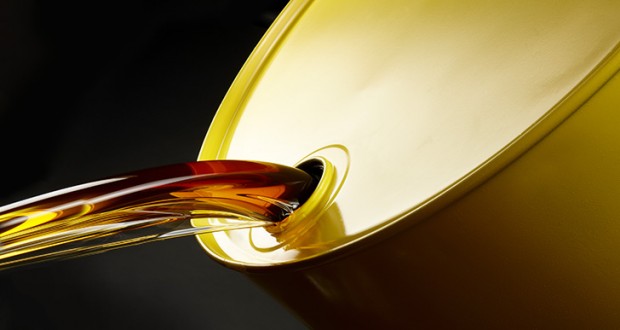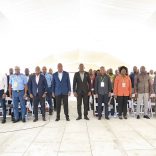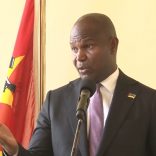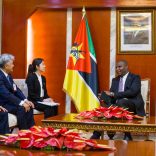Mozambique has lost $3.1M to illegal mining in Zambézia so far this year, provincial official says
Fuel subsidies cost Mozambique huge sums – govt

The generalised fuel subsidies practised by the previous Mozambican government, under President Armando Guebuza, led to colossal debts to the fuel distribution companies, which the current government has not yet been able to pay off in full, according to Almirante Dimas, deputy director of hydrocarbons and fuel in the Ministry of Mineral Resources and Energy.
Speaking at a Maputo press briefing Dimas said that between 2011 and 2014 the Guebuza government ran up a debt to the distribution companies of 330 million US dollars. Although, the current government has abolished indiscriminate fuel subsidies, there remains a debt equivalent to 77 million dollars.
Dimas said the government is committed to clearing this debt, but cannot do so immediately. The compensation for subsidies was thus being paid gradually to the companies. He warned that failure to compensate the companies would run the risk of the country simply running out of fuel.
The government has now unfrozen the fuel prices and reverted to the practice of reviewing the prices every month, and altering them whenever the cost of importing liquid fuel, when expressed in the Mozambican currency, meticais, moves in either direction by more than three per cent.
This mechanism is enshrined in a government decree of 2012, which the Guebuza government simply ignored. The generalised subsidy had perverse effects: it benefitted anyone who owned a car, and therefore subsidised the rich. Since fuel in Mozambique was cheaper than in neighbouring countries, the subsidy encouraged motorists from South Africa or Zimbabwe to cross the border and fill up their tanks in Mozambique.
The import of liquid fuels is in the hands of IMOPETRO, which is an association of all the fuel distribution companies active in Mozambique. All the companies are obliged to be members of IMOPETRO, and this single import mechanism ensures economies of scale.
Currently a litre of petrol costs 65.01 meticais (about 1.06 US dollars). But IMOPETRO General Director Joao Macandja told the reporters that, if IMOPETRO did not exist, and each fuel company imported its own requirements, the average price of petrol would soar to around 90 meticais a litre.
The return to monthly price adjustments means that Mozambican fuel prices are no longer greatly out of line with those in the rest of the region. Only in Tanzania is petrol significantly cheaper, at the equivalent of 57.79 meticais a litre. In South Africa the current price is the equivalent of 68.16 meticais a litre, and in Malawi it is 68.48. Zimbabweans, however, might still find it worth their while to cross into Mozambique to buy fuel – the Zimbabwean petrol price is the equivalent of 97.76 meticais a litre.
Macandja said the two main determinants of the price of fuel at Mozambican filling stations are the world market price of fuel, and the exchange rate of the metical against the US dollar, the currency in which fuel imports are denominated.
IMOPETRO organises international public tenders to purchase fuel, governed by World Bank rules for fuel procurement, said Macandja. Supply contracts are awarded based on a combination of the price and quality of the fuel. The contracts are only signed after approval by the Commission on the Acquisition of Liquid Fuels (CACL), an inter-ministerial commission formed by the Ministries of Finance, Transport, Mineral Resources and Energy, and Industry and Trade, and the Bank of Mozambique.
The procedure is lengthy – for an order placed in late February, the fuel is only being unloaded now. The price fixed by the government for petrol, diesel and kerosene applies to the port cities where the fuels are unloaded (Maputo, Beira, Nacala and Pemba). Elsewhere in the country, the distributors can add legitimate transport costs.
Despite the elimination of the general fuel subsidy, the government still subsidises the diesel used in key economic areas – in agriculture, in artisanal fishing, and in those places not yet linked to the national grid which depend on diesel-fired power stations for their electricity.
Moises Paulino, national director of hydrocarbons and fuel, admitted that the government is still subsidising the diesel used in privately owned minibuses (known as “chapas”) that provide much of the passenger transport in Mozambican cities.
The declared government policy is to replace this subsidy with the acquisition of more buses that will be sold to the private operators at preferential prices. Paulino said this policy would only be implemented “gradually” – in other words, the government is currently paying both for the import of new buses and for a generous subsidy to licensed chapa operators. He admitted that the government needs to find “other ways” to support private transport operators.
The cost of fuel to Mozambique varies considerably, depending on the vagaries of the world oil market, often hit by geopolitical events (such as the current great power clash over Syria) that are completely beyond Mozambique’s control. Thus Mozambique spent 584 million dollars on fuel imports in 2016, but the sum soared to 794 million dollars in 2017.












Leave a Reply
Be the First to Comment!
You must be logged in to post a comment.
You must be logged in to post a comment.